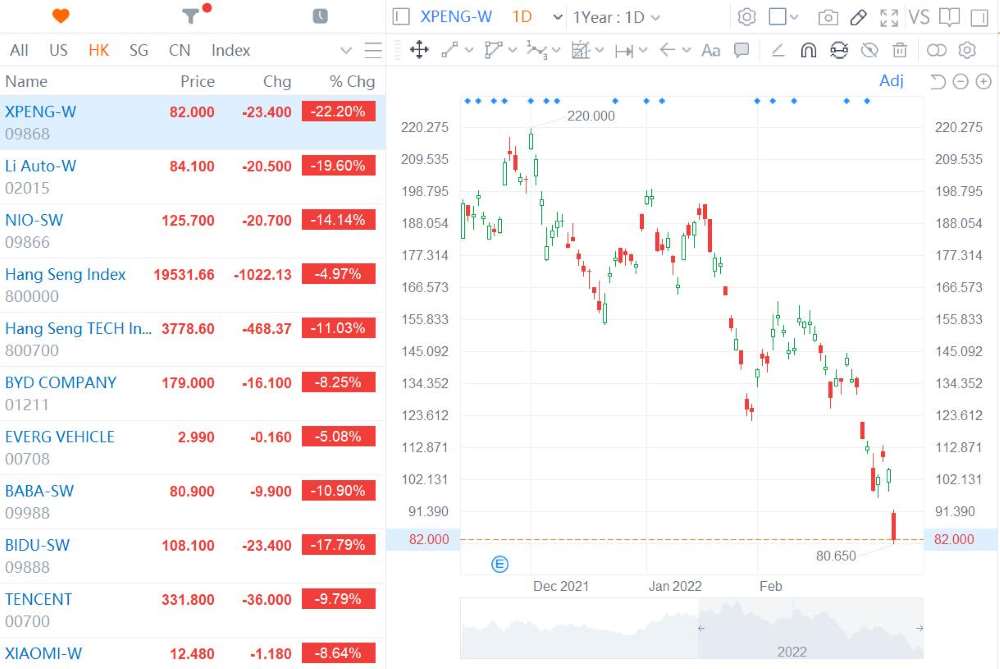By the close of trading, Nio was down 14.14 percent in Hong Kong, Xpeng was down 22.2 percent, and Li Auto was down 19.6 percent. The Hang Seng Tech Index plunged 11.03 percent, the biggest one-day drop.
People dumped Hong Kong stocks on Monday like the world was coming to an end, even though there was nothing new to trigger panic other than last week's old news.
By Monday's close, Hong Kong's Hang Seng Index was down 4.97 percent. The Hang Seng Tech Index plunged 11.03 percent, the biggest one-day drop since it was launched on July 27, 2020.
Like other technology companies, shares of Nio, Xpeng Motors and Li Auto, the leading Chinese electric vehicle companies listed in Hong Kong, all plunged.
By the close of trading, Nio (NYSE: NIO, HKG: 9866) was down 14.14 percent to HK$125.7. It has fallen a cumulative 21.4 percent since listing in Hong Kong on March 10.
Xpeng (NYSE: XPEV, HKG: 9868) fell 22.2 percent to HK$82 today, down 50 percent from its offering price of HK$165.
Li Auto (NASDAQ: LI, HKG: 2015) fell 19.6 percent to HK$84.1, 28.7 percent below its offering price of HK$118.
Last week, the US Securities and Exchange Commission's (SEC) provisional list of issuers identified under the Holding Foreign Companies Accountable Act (HFCAA) was noted which includes five Chinese companies: BeiGene, Yum China, Zai Lab Limited, ACM Research, and HUTCHMED.
Under the HFCAA, the SEC has the authority to delist a foreign listed company from the exchange if it fails to file the reports required by the Public Company Accounting Oversight Board (PCAOB) for three consecutive years.
Stocks of US-listed Chinese companies fell sharply last Thursday and Friday after the list was reported.
Even though Nio, Xpeng and Li Auto have all made dual listings in the US and Hong Kong, their US-traded shares have all accumulated losses of about 20 percent in the past two trading days.
Notably, the China Securities Regulatory Commission (CSRC) said on March 11 that they had taken note of the situation and it was a normal step for US regulators to enforce the HFCAA and related implementation rules.
Subsequently, local media Cailian cited sources close to the Chinese regulator as saying that dialogue and consultations between the Chinese and US regulators on regulatory cooperation on audits are progressing well, with both sides demonstrating a willingness to resolve issues in good faith, and a consensus is expected to be reached soon.
Hong Kong stocks may open sharply lower after the overnight plunge in US equities, but usually do not fall further sharply without new negative factors.
So, are there any new factors adding to investor fears?
Covid lockdown in some Chinese cities could be one of the new factors. Shenzhen, in southern China, announced yesterday that all public transportation in the city was shut down and residential areas began to be closed until March 20.
The northeastern province of Jilin, for its part, banned residents from traveling to other cities or provinces from March 14 to reduce the risk of a spreading virus.
It is worth noting that such moves have been made frequently before without significant impact on the market.
Back Nio, Xpeng and Li Auto, there is no significant negative news about them, other than the possible impact of the above factors.
Norges Bank, the Norwegian central bank, increased its position in Nio by 31 percent and in Li Auto by 990 percent in the fourth quarter, last week's filing showed. It reduced its position in Xpeng by 20 percent.
Xpeng announced today that it has become a member of three major European automotive associations, the first Chinese brand to do so.
The Shenzhen Stock Exchange announced today that it has made changes to the Shenzhen-Hong Kong Stock Connect list to include Li Auto Hong Kong shares, effective today.
